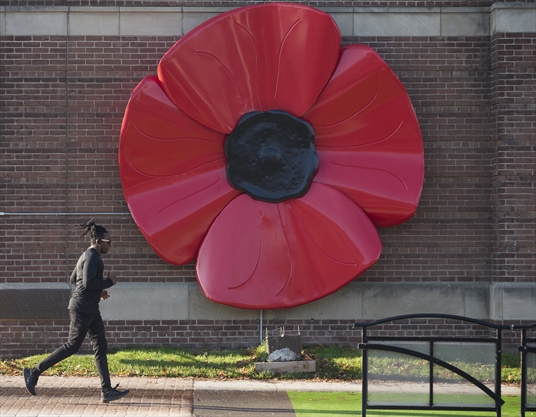With their traditional revenue streams choked by the COVID-19 pandemic, Ontario’s Royal Canadian Legion branches are facing shortfalls of the cash they need to operate year-round.
Fortunately, they, and the Royal Canadian Legion at-large, are adopting novel methods to raise funds for operating costs and veteran supports. Among those methods is an update to the traditional poppy campaign: cashless payment.
Garry Pond is a war veteran and now serves as president of the Royal Canadian Legion’s Ontario Command. He said that, without the ability to rent out their event spaces, host guests in their bars and dining rooms, and plan in-person fundraisers during various stages of the province’s COVID-19 shutdowns, Ontario’s legion branches have taken a financial hit this year.

“We have some branches that are suffering, just like everybody’s suffering in our type of business,” he said. “Legion halls, hall rentals, weddings — those kinds of things we’re involved with — are suffering everywhere.”
Individual locations use funds from branch events to cover operating costs throughout the year. Without this income, Pond said, as many as six branches that were already struggling before the pandemic are in the process of closing permanently. Pond declined to say which branches were closing, but said some had struggled with shrinking memberships due to the aging-out of their members before COVID-19 struck. That remains an ongoing issue.
“A lot of it is to do with just the nature of things, because of failing membership, and it’s related to COVID-19 in the sense that it pushed (the decline) faster,” he said. “The branches that are in trouble are branches that were in trouble before COVID-19.”
In addition to serving as a community hub, Pond said each branch has a dedicated provincial services officer who offers veterans in-person assistance benefit applications and Veterans’ Affairs paperwork.
“If the branches don’t survive, there’s nobody there to help our veterans who need assistance,” Pond said. “So it’s absolutely critical that the branches survive.”
Aside from year-round fundraising for operational costs, the Royal Canadian Legion raises funds to assist individual veterans through its annual poppy campaign, which Pond said is also suffering this year.
Funds raised through the sale of poppies are used to assist veterans with housing costs, to help match them with service dogs and to provide other forms of support. This year, the campaign has experienced a low profile because volunteers who would normally sell poppies and collect donations near the entrances of businesses aren’t able to do so. Pond also guessed people’s reluctance to carry small change due to the pandemic isn’t helping.
To soften the blow of the pandemic to its coffers, Pond said the Royal Canadian Legion has upgraded its poppy campaign to meet people where they are, by adding a contactless payment option for people looking to purchase a poppy without donating change. The Legion also offers virtual poppies supporters can
“The poppy campaign is probably going to suffer but we’re optimistic that it’s not going to be too bad, and Canadians across the country love wearing the poppy,” Pond said.
He said individual branches have also adapted to the pandemic by hosting contests and games like “Catch the Ace” that people can participate in from home, selling takeout meals from their kitchens and launching crowdfunding campaigns.
“Our branches are doing better than I would have thought at this point in the game. They are doing well to make money however they can, and survive,” Pond said. “They’re finding ways to adapt and they’re being very diligent about how they deal with stuff. We have some branches that have done quite well with GoFundMe.”
Pond is also optimistic about the $20 million the federal government pledged to help veterans’ groups.
He urges civilians who want to support veterans to remember to donate to the poppy campaign, but said they can also support their local legion branches by becoming members. Although the Royal Canadian Legion exists to support veterans, anyone over the age of 18 can become a legion member. Annual membership dues help cover branch operating costs and keep branches open to veterans who need them.
“The best way anybody can help the legion is to become a member,” Pond said, “and help us help our veterans.”
